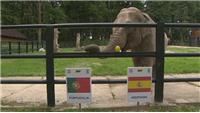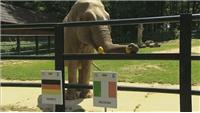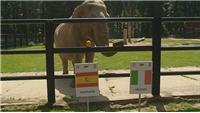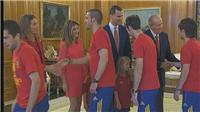

Hodgson is right about Rooney. He is at his most potent when playing off a principal striker and if that means employing a more traditional 4-4-2 formation, or a slight variation on the theme that looks more like 4-2-3-1, then that is probably is the way forward.
It might sound like a regressive step to some but it is a system that worked pretty well for Manchester United when they won their Treble in 1999 and it is one Sir Alex Ferguson still uses when he plays Rooney with Danny Welbeck, Javier Hernandez or Dimitar Berbatov.
‘We all know Rooney is best in that position, as a No 10,’ said Hodgson. ‘The fact that he is such a good player and can play in other positions, that’s another matter. From my conversations with him, from all the games I’ve watched him play, I think he’s extremely dangerous when he plays as a second striker.
‘Young did the same job for me tonight. When you play with two strikers, one of them is dropping deep. Every team in the world does that today.
‘It’s quite good sometimes if the bigger man is the one who comes deep and becomes the target in that space between midfield and their defenders, and your quick man is the one who is actually on the shoulders of the defenders.
‘The good thing is Ashley and Andy showed tonight that they can do both. It was an impressive performance from the two of them.’
So the plan is to play two strikers against France?
‘Yes, I think so,’ added Hodgson. ‘The way forward with England is going to be that way because we have Rooney. We don’t have him for the first two games of the Euros, and we might end up missing him. We might regret that. But it’s a temporary thing.
‘There’s a lot of football to be played after the Euros. When you have a player like Rooney and a player like Young, it would be a bit strange if you just went with one lone forward.’
- Arbeloa: Spain must never change their style
- Wedding bells turn Iniesta's legs to jelly
- Pele: Brazil's 1970 World Cup winners better than Spain
- Pirlo: Only Spain are superior to Italy
- Spain disproved boring tag with empathic final win, insists Alonso
- Fernando Torres revels in Euro 2012 crown
- Italy can reach the final at World Cup 2014
- Johan Cruyff: I enjoyed Italy and I'm a big fan of Del Bosque's Spain
- De Gea & Mata named in Olympics squad
- Shevchenko: Euro 2012 was a success for Ukraine
Hot News
- Funny Balotelli!
- Spanish fans celebrate Euro Cup win
- That's German WAGS!
- The sexy female fans in Euro 2012
- Euro 2012: Spain fans celebrate victory
- Spain vs Italy in clash of the Euro WAGs
- Euro 2012 Final - Spain 4 : 0 Italy, Part 2
- Germany knocked out by Italy
- Natalia Siwiec blasts Sol and the BBC
- Coleen Rooney reveals her bikini body secrets
- Italy's fans celebrated wildly
- Euro 2012 Final - Spain 4 : 0 Italy, Part 1
| Rank | Team | W/D/L | Pts |
|---|
Cities & Stadiums
The Top 3 Teams of Previous Tournaments
| Year | Winners | Runner-up | Third place |
|---|---|---|---|
| 2008 | Spain | Germany | Russia / Turkey |
| 2004 | Greece | Portugal | Netherlands / Czech Republic |
| 2000 | France | Italy | Netherlands / Portugal |
| 1996 | Germany | Czech Republic | France / England |
| 1992 | Denmark | Germany | Netherlands / Sweden |
| 1988 | Netherlands | Soviet Union | Italy / West Germany |
| 1984 | France | Spain | Denmark / Portugal |
| 1980 | West Germany | Belgium | Czechoslovakia |
| 1976 | Czechoslovakia | West Germany | Netherlands |
| 1972 | West Germany | Soviet Union | Belgium |
| 1968 | Italy | Yugoslavia | England |
| 1964 | Spain | Soviet Union | Hungary |
| 1960 | Soviet Union | Yugoslavia | Czechoslovakia |




